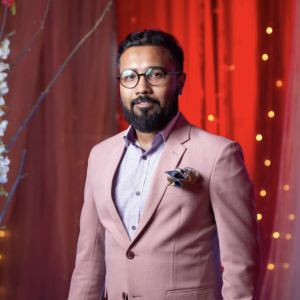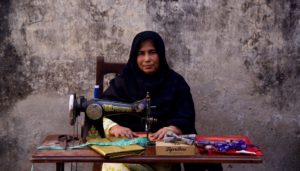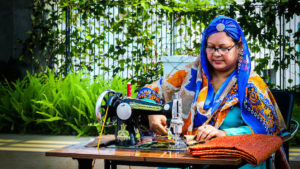Please introduce yourself (name, age, college, country, background)
I am Wahid Hossain and I am 29 years of age. I was born and brought up in Dhaka, Bangladesh. I gained a Bachelor’s degree from my local university, and I also studied Social Innovation & Entrepreneurship at Watson University in Boulder, Colorado.

What three adjectives would people use to describe you?
Smart, Generous, and Persistent.
What do you love most about your home community?
The greatest thing about my community is our generosity. Despite having limited resources we are able to live happily. We are resilient and we are creative.
Tell us about your venture.
My venture, TigerBow, is an ethical fashion company that empowers Bangladeshi women artisans to continue their craft while keeping Bangladesh’s rich tradition of cultural fabrics alive. Our main product is a bow tie which is made out of traditional Bangladeshi ‘katan’ fabric. We also make pocket squares, earrings, designer shirts, and scarves which are inspired by traditional Bangladeshi fabrics and motifs.
Through TigerBow, we work directly with 13 women artisans and have impacted more than 113 lives so far. On average, we increase the monthly income of our female artisans by 50%. This means their daily income rises from $3.1 to $4.7 US Dollars. It may not seem like a lot, but this allows our artisans to improve their standard of living, support their families, send their children to school, and break the cycle of poverty.
With the help of The Resolution Project, we have been able to develop a world-class product and distribution channel in the United States. We have also found success with some larger business partners across Bangladesh. With better access to markets, we can increase sales even further and help even more artisans.
Have you been personally affected by this issue? If so, how?
I have lived in Mirpur, Dhaka for my whole life. My community is famous for its craftsmanship. I grew up watching artisans make beautiful banasree wedding sharee (silk), Katan fabric, and much more. People used to come to Mirpur to buy these amazing crafts from far away. Our artisans’ craftsmanship was highly appreciated.
As I grew older, I saw a shift in consumer buying patterns. Millennials no longer appreciate craftsmanship the way previous generations did. Artisans are losing their market and are therefore giving up the profession. Nowadays, an artisan doesn’t want their children to follow in their footsteps due to the downfall of this industry. However, there are a few artisans who still want to continue their craft even though they are struggling financially. I am not an artisan, but I respect what the people in my community do. I want this cultural fabric to remain alive because this is something that represents who we are. Without this, we will lose our own identity.
What inspired you to start your venture?
I always dreamed of becoming a model businessperson—to earn a lot and perform well. I studied marketing and traveled overseas to attend conferences. My entire focus was to build the skills I would need to earn my dream—the “Bangladeshi dream.”
My life changed in 2013 when I met Sabina, a Bangladeshi artisan. She came to deliver bed covers to my mother, and I was shocked by how beautiful they were. I couldn’t contain myself and asked her where she got them from. She said she had made them herself but that she struggled because she made very little money—less than $100 per month—by selling them. When I suggested she join a garment factory, she replied that she wanted to continue this traditional craft, no matter how difficult it was. She said if she stopped doing it, no one would know that the bed covers ever existed. That answer changed my life. All I had been dreaming about was the “Bangladeshi dream,” but I never considered what impact I could have on my community and the world. Since then, I have been working to empower Bangladeshi women artisans through my social venture TigerBow.
What does the Resolution Fellowship mean to you?
I still remember the day I won the Social Venture Challenge at the Harvard National Model United Nations conference in Boston, Massachusetts. After being briefed by the Resolution staff about the seed funding, mentorship, and pro-bono services I would receive, I started to comprehend what winning the Fellowship meant for me and my venture. I was so happy. From where I am from, winning a Fellowship from an international organization is very uncommon. The compassion and empathy that Resolution has is truly remarkable. I feel safe no matter what happens, as I know that Resolution will always find a way to help me.

How has the Fellowship helped you achieve your goals?
Before becoming a Fellow, I had no idea about social entrepreneurship. For the last seven years, my Resolution Guides have helped me develop as an entrepreneur and also helped me work on my professional skills and problem-solving skills. The professional network that Resolution provides me is beyond my wildest expectations. Without the pro-bono services provided by Resolution, I don’t believe TigerBow would be what it is today.
What advice would you give other college students who are looking to start their first social venture?
I think it is confusing for most young people to think about their career paths. I was confused and scared in college. My advice would be that finding focus is the key. We often want to achieve everything overnight, but nothing good happens overnight. To achieve something important and monumental you need to take small steps each day. Before starting work on your social venture, the most important thing is to understand the problem you are trying to fix. If you know your problem very deeply, your social venture will have a much higher chance of succeeding.
What role do young leaders play in the world today?
Our generation is stronger than ever before. We are very interconnected and can, therefore, share knowledge, resources, and expertise to create better solutions to our problems. We need to decide how we are going to use this connectivity—will we use it selfishly or will we use it to create a better world?
Why is it important for young people to focus on social impact?
If the younger generation doesn’t take responsibility for solving the problems we are faced with, they will continue to exist. Solutions depend on our will. COVID-19 shows us how important it is to focus on health care, education, and maintaining a strong and collective economy. We need to think about social impact more than ever before because without it the world might never rebound from the current crisis.
What have you been working on recently in response to COVID-19?
My community has been badly affected by COVID-19. Bangladesh has been locked down for a little over a month. Despite the health challenges, we also face the realities of extreme poverty. A large percentage of the population cannot afford basic meals due to the current lockdown. In my community, I see people are struggling to find food, especially rickshaw drivers, garment workers, and underprivileged artisans.
I have responded by creating a relief effort alongside my friends and family, who have helped me distribute resources to 100 families so far. I am now planning the second phase of my initiative, which aims to provide relief to 500 families. I plan to work with my artisans to create 5,000 face masks. I am also coordinating with my friend to produce 5,000 bottles of hand sanitizer. I will distribute the hand sanitizer and face masks to rickshaw pullers, cleaners, and other frontline emergency workers who still have to work outside. I am looking for generous support to make this happen and have created a Go Fund Me campaign which you can see here.
What are your goals for the future?
I am more determined than ever to continue my journey in social entrepreneurship. The people who I work for—the underprivileged women artisans of Bangladesh—need me more than ever before. We are going to face a possible recession and we don’t know how our underprivileged community will fight against this. It will not be enough to just continue what I am currently doing. I need to be more creative and hardworking to find solutions for not only the artisans I currently support but for many more underprivileged people.
